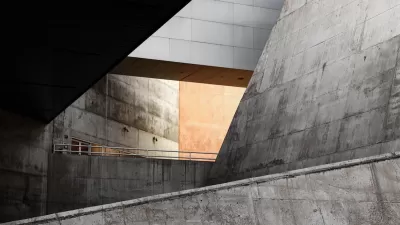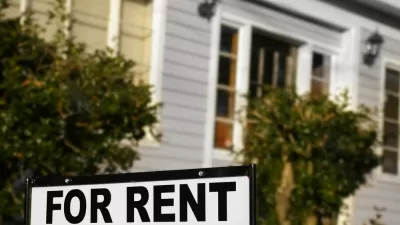As D.C.'s J. Edgar Hoover Building reaches the end of its 40 years of service as the headquarters of the FBI, one of the city's last examples of Brutalist architecture is getting little love from preservationists as discussion begin over its fate.
Several prominent preservation efforts of late (see the Orange County Government Center and Prentice Women's Hospital) have centered on the fate of Brutalist masterpieces of the 1960s and 70s. As preservationists, architecture critics, public officials, and the public debate the merits of saving these notoriously hard to love buildings, Jonathan O'Connell reports that preservationists in Washington D.C. are unlikely to put up much of a fight to save one of the iconic buildings of the Brutalist era.
The Hoover building was recently named the ugliest building on Earth by a travel Web site, and you won't find much argument from D.C. preservationists, many of whom are "still smarting from a very public and contentious debate to protect
another [Brutalist] D.C. building, the Third Church of Christ, Scientist, which they ultimately lost."
"There's not a lot of love for [the Hoover] building," said Rebecca Miller, executive director of the D.C. Preservation League. "And it's
such a primary piece of real estate that saving the building would be a
very difficult endeavor."
"Indeed, the [Preservation League's] chairman, John D.
Bellingham, president of Falls Church-based Monarc Construction, said
there was unlikely to be a similarly fierce battle for the Hoover
building as there was for the church," notes O'Connell.
"Is it a building that a lot
of people like? Probably not. Is it a building that people will try to
preserve? My instinct tells me probably not," he said.
FULL STORY: Preservationists back out before fight over FBI’s Hoover Building even begins

Alabama: Trump Terminates Settlements for Black Communities Harmed By Raw Sewage
Trump deemed the landmark civil rights agreement “illegal DEI and environmental justice policy.”

Study: Maui’s Plan to Convert Vacation Rentals to Long-Term Housing Could Cause Nearly $1 Billion Economic Loss
The plan would reduce visitor accommodation by 25% resulting in 1,900 jobs lost.

Planetizen Federal Action Tracker
A weekly monitor of how Trump’s orders and actions are impacting planners and planning in America.

Wind Energy on the Rise Despite Federal Policy Reversal
The Trump administration is revoking federal support for renewable energy, but demand for new projects continues unabated.

Passengers Flock to Caltrain After Electrification
The new electric trains are running faster and more reliably, leading to strong ridership growth on the Bay Area rail system.

Texas Churches Rally Behind ‘Yes in God’s Back Yard’ Legislation
Religious leaders want the state to reduce zoning regulations to streamline leasing church-owned land to housing developers.
Urban Design for Planners 1: Software Tools
This six-course series explores essential urban design concepts using open source software and equips planners with the tools they need to participate fully in the urban design process.
Planning for Universal Design
Learn the tools for implementing Universal Design in planning regulations.
Caltrans
Smith Gee Studio
Institute for Housing and Urban Development Studies (IHS)
City of Grandview
Harvard GSD Executive Education
Toledo-Lucas County Plan Commissions
Salt Lake City
NYU Wagner Graduate School of Public Service




























